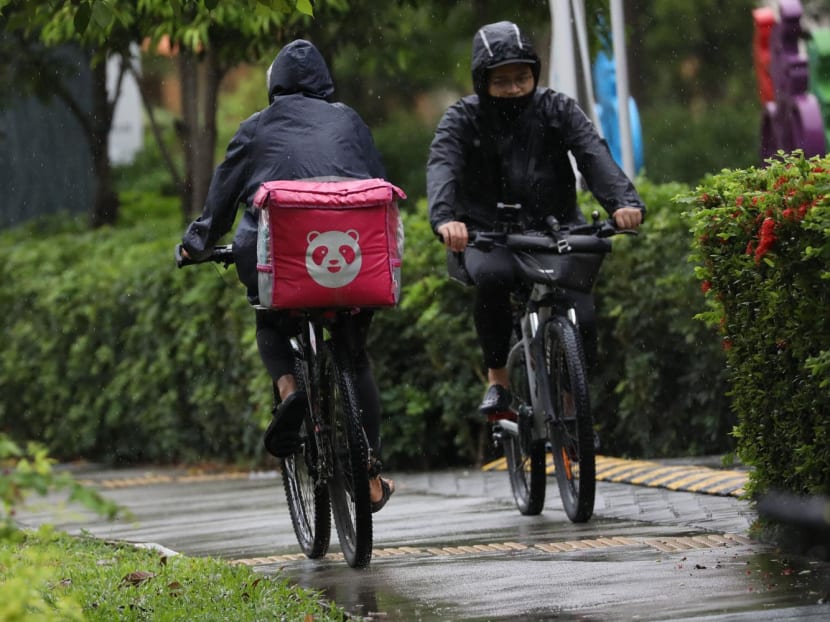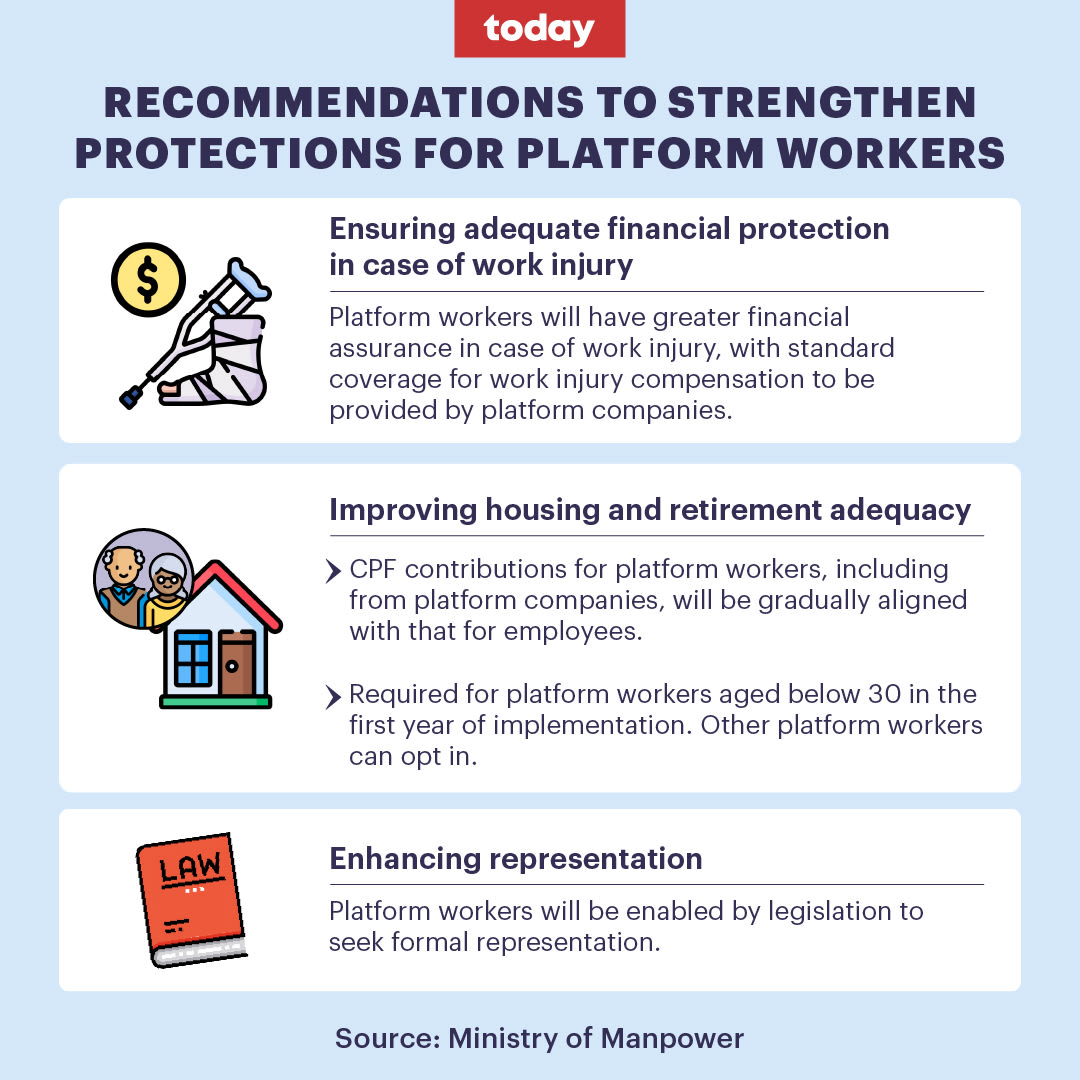Compulsory CPF contributions for younger gig workers to come as Government accepts advisory panel’s proposals
SINGAPORE — It will soon be mandatory for platform workers aged below 30 to make Central Provident Fund (CPF) contributions, while an opt-in system will be available for older workers. This is after recommendations by a committee looking into these workers' welfare were accepted by the Government.

- An advisory committee on platform workers under the Ministry of Manpower has proposed ways to strengthen protections for these workers
- One is that platform workers aged below 30 contribute to CPF
- For workers aged 30 and above, they will be allowed to opt in to contribute to CPF
- The proposals have been accepted by the Government
SINGAPORE — It will soon be mandatory for platform workers aged below 30 to make Central Provident Fund (CPF) contributions, while an opt-in system will be available for older workers. This is after recommendations by a committee looking into these workers' welfare were accepted by the Government.
The contributions to CPF, the national savings scheme for retirement, will be increased in phases over a period of five years, with an average of 2.5 per cent yearly increments for platform workers and 3.5 per cent for companies.
Platform workers would include food delivery workers and private-hire car drivers providing ride-hailing services, for example.
The various recommendations were laid out in a report by the advisory committee on platform workers on Wednesday (Nov 23), to help safeguard the housing and retirement adequacy of these workers.
The committee, which was set up by the Ministry of Manpower last year to propose ways to strengthen protections for platform workers here, noted that many of these workers who "generally have modest incomes" are concerned about contributing to CPF on their own without co-contributions from platform companies such as food delivery and ride-hailing firms.
"Platform workers should have the same level of CPF savings for housing and retirement as employees with similar lifetime earnings," the committee said.
At the same time, the committee's consultations with more than 20,000 gig workers found that opinions were divided on whether there should be compulsory CPF contributions, with half wanting them and the other half mainly concerned about the impact on their take-home earnings.
WHAT IT WILL MEAN FOR WORKERS
The committee thus recommended that mandatory CPF contributions should apply to platform workers who are aged below 30 in the first year of the ruling coming into effect, while platform workers aged 30 and above may voluntarily opt in for the contribution.
For instance, if the ruling is to begin in January 2025, then any worker born in 1995 or later must have CPF contributions, regardless of their age when they began work for the platform. For example, a 31-year-old in 2027 would have been born in 1996 and it will still be mandatory for him or her to contribute to CPF.
The committee said in a statement that younger platform workers "are more likely to have housing obligations or plans to buy a house and can use Ordinary Account contributions to pay for housing loans".
It added that with a "longer runway" to accumulate savings, they may then benefit from the compounding effect of CPF interest rates.
For workers aged 30 and above at the time the ruling takes effect, they will be allowed to opt in for CPF contribution.
The committee said that platform workers are "a heterogenous group" with different needs.
"It is important to preserve flexibility and choice for older workers, as some may already have plans for retirement or have paid off their housing loans," it added.
"Nonetheless, older workers should be given the choice to benefit from additional CPF contributions."
However, once older workers opt in for CPF contribution, there will be no opting out of it, TODAY understands.
WHAT IT WILL MEAN FOR COMPANIES
The committee also said that platform companies that exert "significant level of management control over platform workers" should provide CPF contributions at the same rates as employers.
They should make these provisions because it would be "challenging for platform workers to achieve the same CPF contribution rate on their own, given that they generally earn modest incomes".
A "significant level of management control" would imply that platform companies are in a position where they are, for example, able to assign jobs to the workers and later take a cut of the revenue.
To facilitate the collection of CPF contributions, the committee recommends that platform companies work with the Government to develop a mechanism to deduct CPF contributions from platform workers’ earnings as and when the workers receive their income.
WHY TAKE A STAGGERED INCREASE IN CPF CONTRIBUTIONS
The committee recognised that immediately imposing the full CPF contribution rate applicable to gig workers would bring about significant costs on the platform ecosystem.
"There would be a real risk that it results in prohibitive increases in business costs for platform companies, decreases in take-home pay for platform workers or increases in price for platform users," the committee said in its report.
It therefore recommended that there be a progressive increase in CPF contributions over five years, "unless major economic disruption warrants a longer timeline".
A staggered increase over five years will enable platform workers to accumulate "significant CPF savings" to meet basic housing and retirement needs.
"In particular, a young platform worker today is estimated to be able to accumulate about 95 per cent of the CPF savings that an employee with similar earnings can expect to set aside at age 55," the committee said.
The staggered approach would mean an average of 2.5 per cent increase in the CPF contribution rates yearly for platform workers and a 3.5 per cent increase for platform companies.
The CPF contribution rates are also applied on total earnings, subtracting the expenses that the workers incur, such as in fuel costs or vehicle maintenance.
For example, private-hire car drivers and taxi drivers may choose to use a fixed expense deduction ratio of 60 per cent.
This would mean that the CPF contribution rate applies to just 40 per cent of their gross earnings, and the average extra annual CPF contribution will be 1 per cent of gross earnings for such drivers and 1.4 per cent for their companies.
The committee also recognised that even though platform workers will likely see higher total earnings due to CPF contributions, their take-home pay may drop as a result.
"To ease the impact, the Government may wish to consider providing support for platform workers and the form of support this should take," the committee suggested.
Other than increased costs to platform workers and their companies, the added costs associated with the collection of CPF may also be passed down to consumers and businesses.
However, the committee said that based on recent surveys, consumers and business users of platform services are "prepared to pay more if it contributes towards improving the protections of platform workers".
For example, a survey by the Singapore Management University this year found that consumers were on average willing to pay 21.5 per cent more for their point-to-point transport fares — if it will go towards initiatives to better support drivers in terms of work injury compensation and retirement support.
HOW WILL IT AFFECT CONSUMERS
Addressing reporters on Wednesday, Ms Goh Swee Chen, chairperson of the advisory committee, said: "The committee is fully aware that the recommendations do come with trade-offs. But we hope everyone can see that the benefits ultimately outweigh the trade-offs."
She added: "Beyond the committee’s recommendations, everyone in society needs to play their part to strengthen protections for these platform workers. This includes platform workers themselves, who will need to set aside more for their housing and retirement benefits and needs."
In response to questions by the media on whether consumers will need to pay higher prices, Dr Danny Quah, vice-chairperson of the committee, said that it depends on various factors.
"It depends on what else the companies are doing, how much they are spending on different things... the way they carry out their business and how much the Singapore consumer can tolerate these rising prices."
However, the committee expects that the pass-through to consumers "will not be large", he added.
Agreeing, Dr Koh Poh Koon, Senior Minister of State for Manpower who is the committee's adviser, said it is unlikely that large price increases will be directly passed on to consumers since the companies would want to remain competitive.









